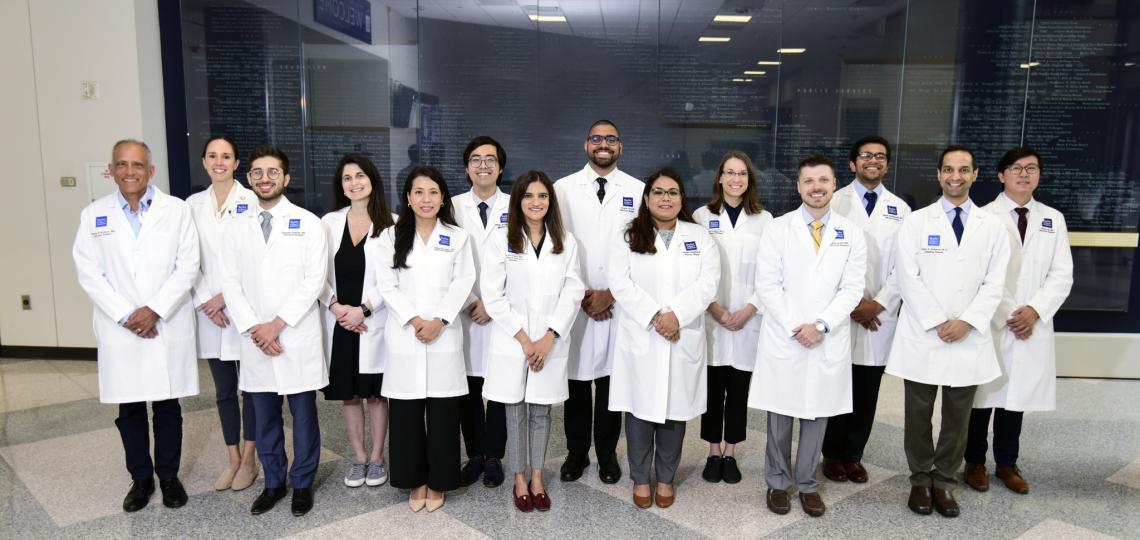About the Program
The Infectious Diseases Training Program at Baylor College of Medicine offers comprehensive clinical training and diverse research opportunities in the largest medical center in the world. Our faculty are dedicated clinical, education, and research leaders in the field of infectious diseases and have a longstanding record of successful mentorship of fellows. Our fellowship program has a 100% passage rate in the ABIM Infectious Diseases board examination.
Annually, three training positions are offered in our Traditional Infectious Diseases Training Program and three positions in our Immunocompromised Infectious Diseases Training Program, which is a joint fellowship between the Infectious Diseases sections at Baylor College of Medicine and MD Anderson Cancer Center.
In some years, we also offer one training position in a combined adult-pediatric ID track. This track is jointly administered by our program and the Pediatric Infectious Diseases fellowship program.
Strengths of our Program
Texas Medical Center: Training in infectious disease at Baylor means access to the largest medical center in the world and providing care for patients of all means and backgrounds from across the globe. Whether you choose to join our traditional or immunocompromised tracks, you will become proficient in general infectious diseases at the Michael E. DeBakey VA Medical Center, tropical and global medicine at Ben Taub Hospital, HIV care at Thomas Street at Quentin Mease Health Center, and cancer and transplant infectious diseases at Baylor St. Luke’s Medical Center and MD Anderson Cancer Center. You will learn to thrive as a physician in the private, public/underserved, and governmental institutional settings, and you will find a combination of patients and diagnoses that are rarely found elsewhere.
Mentorship to meet your goals: Drawing from infectious disease specialists across our four major affiliated institutions, our clinical faculty include experts in every aspect of infectious diseases, including general infectious diseases, respiratory pathogens, vaccinology, tropical medicine, transplant ID, oncologic ID, HIV, hepatitis C, infection control, antibiotic resistance, and many others. Many of our faculty are active in research with longstanding research programs. In addition, our fellows also have access to mentors in other departments, including Molecular Virology and Microbiology and Pediatrics; in other schools within Baylor, including the National School of Tropical Medicine; and in other institutions in the Texas Medical Center, including MD Anderson Cancer Center and The University of Texas Health Science Center at Houston. Whether you are interested in basic, translational or clinical research or in their related specialized fields of clinical practice, we can help you find the right mentors among our faculty and our sister institutions to ensure that your academic career flourishes. We have a T32 training program that develops a research career. View our research page.
A flexible curriculum: Having difficulty deciding whether you want to train at a ‘clinical program’ or a ‘research program?’ Interested in HIV but don’t want to commit to a fellowship that seems to offer training in little else? Our program’s wealth of clinical, research, and mentorship opportunities allows you to customize your fellowship experience to your specific interests and needs while still ensuring you receive a strong foundational experience in infectious diseases. View curriculum information.
Do you want training that will prepare you for an academic career as a clinician educator? Do you want to become a clinician scientist? Perhaps you are interested in private practice in general clinical infectious diseases? Are you looking to specialize in immunocompromised and critical care infectious diseases? Our program has a depth and breadth of opportunities in infectious diseases. Whatever your career goals in this specialty are, we can help you reach them.









